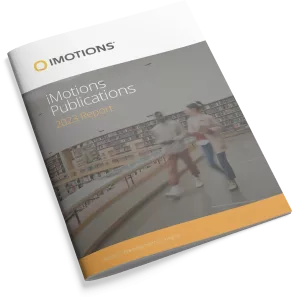-
Psychophysiological responses to takeover requests in conditionally automated driving
In SAE Level 3 automated driving, taking over control from automation raises significant safety concerns because drivers out of the vehicle control loop have difficulty negotiating takeover transitions. Existing studies on takeover transitions have focused on drivers’ behavioral responses to takeover requests (TORs). As a complement, this exploratory study aimed to examine drivers’ psychophysiological responses […]
-
The Effects of Visual Stimuli on Attention in Children With Autism Spectrum Disorder: An Eye-Tracking Study
Attention is one of the fundamental elements of effective learning. The design of learning environments often consists of a blend of visual stimuli. Investigating the effect of visual stimuli types on the attention of children with autism spectrum disorder (ASD) is important for the theoretical understanding of attention. This study explores the effect of social […]
-
Picking Your Brains: Where and How Neuroscience Tools Can Enhance Marketing Research
The use of neuroscience tools to study consumer behavior and the decision making process in marketing has improved our understanding of cognitive, neuronal, and emotional mechanisms related to marketing-relevant behavior. However, knowledge about neuroscience tools that are used in consumer neuroscience research is scattered. In this article, we present the results of a literature review […]
-
Seeing Red? The Role of Font Color, Size, and Sale Sign Location in Retail Garden Center Displays
The goal of this study was to better understand consumers’ likelihood to buy a plant when the word “sale” was presented in red font on a white sign, with a range of font sizes, showing an equivalent discounted price in three ways (dollar amount, 25% percent off, and buy-3-get-1-free), with the sale sign location either […]
-
Predicting Takeover Performance in Conditionally Automated Driving
Abstract: In conditionally automated driving, drivers decoupled from operational control of the vehicle have difficulty taking over control when requested. To address this challenge, we conducted a human-in-the-loop experiment wherein the drivers needed to take over control from an automated vehicle. We collected drivers’ physiological data and data from the driving environment, and based on […]
-
Facial features and head movements obtained with a webcam correlate with performance deterioration during prolonged wakefulness
We have performed a direct comparison between facial features obtained from a webcam and vigilance-task performance during prolonged wakefulness. Prolonged wakefulness deteriorates working performance due to changes in cognition, emotion, and by delayed response. Facial features can be potentially collected everywhere using webcams located in the workplace. If this type of device can obtain relevant […]
-
The effectiveness of online cause-related marketing message framing on hotel brand evaluation
This study aims to examine the interaction effect between advertising message framing (promotion-framed vs. prevention-framed) strategy and brand reputation (high vs. low) on consumers’ brand evaluation (brand attitude, word-of-mouth, purchase intention) in the context of CRM in the hotel industry. Employing a multiple quantitative methods approach with two experimental studies, data were collected through a […]
-
Exploring Multidimensional Measurements for Pain Evaluation using Facial Action Units
Although pain is widely recognized to be a multidimensional experience, it is typically measured by unidimensional patient self-reported visual analog scale (VAS). However, self-reported pain is subjective, difficult to interpret and sometimes impossible to obtain. Machine learning models have been developed to automatically recognize pain at both the frame level and sequence (or video) level. […]
-
QUEST e‑learning portal: applying heuristic evaluation, usability testing and eye tracking
In this study, the development of an e-learning portal for university students is presented. The portal is based on responsive web design which is accessible from anywhere, at any time and on any device. A complementary user experience evaluationmethodology consisting of heuristic evaluation, usability testing, user experience questionnaire, and eye tracking has been applied to […]
-
Your Own Worst Enemy: Implications of the Customization, and Destruction, of Non-Player Characters
Customization interfaces allow players to tailor character appearance to represent desired self-concepts, increasing character identification and contributing towards enjoyment. Yet, despite their ubiquity, such interfaces seldom allow modification of non-player characters (e.g., in-game enemies). A between-subjects experiment (N=34) examined affective/cognitive responses to customizing and destroying enemies in a custom-built game. Participants created characters representing either […]
Research Report 2023
In-depth look at the scientific landscape as powered by iMotions software, showcasing groundbreaking research and the impact of our tools in various scientific and industrial fields.

Share Your Research

850+ universities worldwide with an iMotions human behavior lab
73 of the top 100 highest ranked universities
710+ published research papers using iMotions
iMotions is used for some of the most interesting human behavior research studies carried out by top researchers around the world. Contact us to have your publication featured here.
The authors of these publications have used iMotions as a software tool within their research.
“Software should be cited on the same basis as any other research product such as a paper or a book; that is, authors should cite the appropriate set of software products just as they cite the appropriate set of papers” (Katz et al., 2020).
We therefore encourage you to cite the use of iMotions where appropriate.
How to cite iMotions
APA
iMotions (10), iMotions A/S, Copenhagen, Denmark, (2024).
Note: adjust the version and year where relevant.
5 Most Popular Blogs
Learn How to Conduct Human Behavior Research with iMotions
Publications
Read publications made possible with iMotions
Blog
Get inspired and learn more from our expert content writers
Newsletter
A monthly close up of latest product and research news





